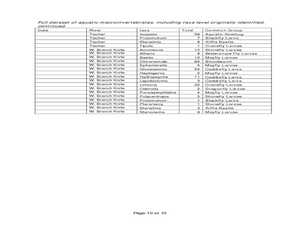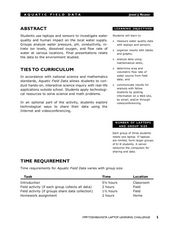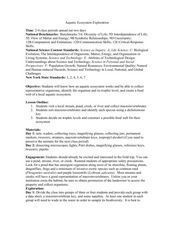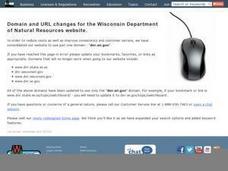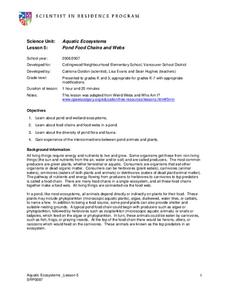Curated OER
The Aquatic Environment
Fifth graders focus on the various types of fish living in different water environments. In groups, they research the different methods used to fish and participate in experiments to determine the effects of mercury on fish, the...
Curated OER
Aquatic Invertebrates
Students examine the impact that human development has on streams. In this stream sampling lesson students compare macroinvertebrate data and graph it.
Curated OER
AMPHIBIAN RESPIRATION
Young scholars describe the structural differences in the respiratory systems of aquatic and terrestrial vertebrates and explain the motivation for these structural adaptations in reference to the differences in habitat.
Curated OER
Aquatic Field Data
Students use laptops and sensors to measure water quality and graph their results. In this aquatics lesson students post their results to a website or email.
Curated OER
Aquatic Ecosystem Exploration
Students visit a local stream, pond, creek, or river and collect macroinvertebrates. They sort macroinvertebrates and identify each species using a dichotomous key. Students decide on trophic levels and construct a possible food web for...
Curated OER
Move To a Healthier Aquatic Balance
Fourth graders examine aquatic orgnaisms and how enviromental chages affect them. This factors include: temperature, Ph, oxygen, nutrients, and pollutants. They also explore habitat quality (erosion). Students compile data and create...
Curated OER
Aquatic Ecosystems
Ninth graders record information on aquatic ecosystems and create a labeled diagram of an ecosystem of their choice. They can choose from an ocean zone, estuary, river, lakes, or beaches. The student has to explain their biome of choice.
Curated OER
Aquatic Habitat Water Quality Experiment
Fifth graders discuss the importance of water quality for humans and fish and make predictions about what happens to water that is polluted. In small groups, they conduct experiments to compare and contrast water that is unpolluted and...
Curated OER
Oxygen Levels and Aquatic Plants and Animals
Students design an experiment to test the effects of a change in the amount of dissolved oxygen of water on aquatic plants and animals. Questions are offered for exploration and experiment design. Results are tabulated and conclusions...
Curated OER
Measuring Aquatic pH
Students apply the scientific method and safety rules to aquatic pH. They test unknown solutions for pH levels.
Curated OER
Does Clear Water mean Healthy Water?
Learners test their local aquatic site to determine its water clarity. They collect a water sample and measure its turbidity using a sensor, then they repeat the experiment to obtain a second turbidity reading to find the average value.
Michigan Sea Grant
Great Lakes, Great Careers
Pupils play a question-asking game to investigate careers relating to marine and aquatic science, then conduct research to further investigate the career of their choice—examples range from marine veterinarian to underwater...
Curated OER
Eutrophication Lab
Young scholars examine the effects of detergents and fertilizers on aquatic life and describe algae. Students define the term eutrophication as the process by which a body of water, such as a pond, lake, stream, or river, has a sudden...
Curated OER
Stream Table
Students explore channelization, riparian habitats and soil erosion to find out about the aquatic habitats in Iowa. In this aquatic habitats lesson, students define important terms and read an article about pollution. Students complete...
Curated OER
Take a Tour of a Biome
Students study five different biome types including aquatic, desert, forest, grassland, and tundra. They create a travel website of a simulated trip to one of the biomes.
Curated OER
Take a Tour of a Biome
Explore the five biomes: aquatic, desert, forest, grassland and tundra by using online resources to investigate one of the five biomes and use MediaBlender to create an informational web site for a tour of that biome. Note: Other...
Curated OER
Water and Land Ecosystems
Students investigate the differences between a land and aquatic ecosystem. They use the information in order to present it in an assessment. There are target questions that can be used to guide research, lead a classroom discussion, or...
Curated OER
Monitoring Aquatic Ecosystems Lesson Plan
Learners perform an experiment to test the quality of the water in a marsh.
Curated OER
Aquatic Safari
Students use an Internet Web site to locate the scientific information about various marine species. They use the Internet to find the scientific information about marine animals.
Curated OER
Using Environmental Models to Determine the Effect of Acid Rain on an Ecosystem
Demonstrate to your middle school science learners how chalk breaks down in a weak acid. Discuss what affects acidic rain might have on ecosystems. Lab groups then choose one of two questions: "How does acid precipitation affect an...
Curated OER
Wetlands Field Trip
Seventh graders used aquatic nets and other equipment to sample organisms in the lake -made plaster casts of footprints found around the edges of the lake -used reference materials to identify all organisms collected -filled out an...
Curated OER
Aquatic Ecosystems
Students study ponds and wetland ecosystems and examine the food chains and webs in them. For this aquatic ecosystems lesson students answer questions about the diversity of the flora and fauna in a pond.
Curated OER
What Is in the Water?
Students compare bottled water qualities to water found naturally in a pond habitat. They research their state's laws/regulations in regard to bottled water and study the advertising, cost, and quality of brands of bottled water. They...
Other popular searches
- Aquatics Games
- Aquatics Safety
- Primary Aquatics
- Physical Education Aquatics
- Aquatics Aerobics
- Infant Aquatics
- P.e. Aquatics
- Pe Aquatics
- Aquatics Lessons
- Parent and Child Aquatics
- Physical Education, Aquatics
- Aquatics Lesson Plan



